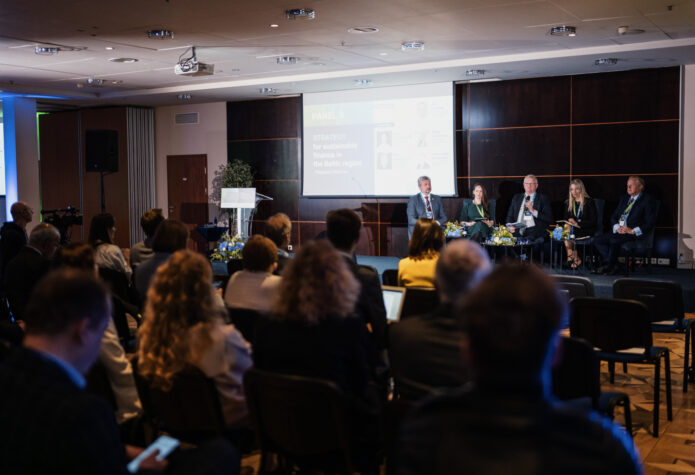”Making green finance a reality in the Baltics” – the tools are already there

”Sustainability-linked loans allow our borrowers to save on interest if they can show that they have implemented initiatives that, for instance, reduce CO2 emissions or water consumption. It is a huge market, and it will for sure come to the Baltic countries,” said NIB Vice-President, Head of Lending Søren Kjær Mortensen, presenting sustainability-linked lending as one of the tools to accelerate green transition at the Making Green Finance a Reality in the Baltics conference in Vilnius. Also available in the toolbox: the development of the Baltic capital markets and the swift action in the current geopolitical situation.
The event, organised by the Lithuanian Ministry of Finance, the European Court of Auditors, and the Lithuanian Banking Association, brought together finance professionals from both private and public sectors. It was attended by the Prime Minister of Lithuania Ingrida Šimonytė, Finance Minister and NIB governor Gintarė Skaistė, European Commission Vice-President Valdis Dombrovskis as well as international financial institutions (IFIs) – the International Monetary Fund (IMF), the European Investment Bank (EIB), the European Bank for Reconstruction and Development (EBRD) and NIB.
Søren Kjær Mortensen, NIB’s Vice-President and Head of Lending, represented the Bank at a panel discussion “Strategy for sustainable finance in the Baltic region”, where he discussed the available tools for green financing together with representatives from the EBRD and officials from Lithuania and Latvia.
Untapped potential in sustainability-linked lending and capital markets
“In all of our lending today we are touching upon the environment – everyone is talking about it,” said Mortensen introducing NIB’s mandate and the different lending products. “In the Nordics, a large share of our financing now goes to sustainability-linked loans (SLL).”
SLLs are connected to key performance indicators in NIB’s customers’ corporate strategies and create financial incentives to meet sustainability targets. According to Mortensen, it provides a new way of financing not only projects, but also sustainable activities, and it is only of question of time when loans of similar structures become popular in the Baltics.
Another area where Mortensen sees the potential to grow is the capital markets of Estonia, Latvia, and Lithuania. In fact, the advancement of capital markets is part of NIB’s recently updated business strategy, and the Bank has already been actively participating in issuances such as Maxima Grupė’s inaugural commercial paper or the recent Latvenergo‘s green bond.
“NIB not only issues environmental and blue bonds, but has also been an anchor investor in various green bonds, and we would like to develop the green bond markets further. This is an area that requires a lot of resources in terms of data collection, but I do not see that there is a way not to do it – as I said, it is really what everyone is talking about, and it is absolutely the right thing to do.”
“We as IFIs can play a role in steering sustainable bond market and sustainability-linked lending forward by setting tougher criteria for issuers and borrowers,” Mortensen added.
Accelerating the green transition in the face of war
As the panellists discussed how the capital markets could be advanced, the current geopolitical challenges had to be taken on board.
“Many decisions now are taken because of Russia, but I think we need to take decisions despite of Russia,” said Atis Zakatistovs, Parliamentary Secretary of the Latvian Ministry of Finance, explaining that investors might have a lot of questions from the energy or military perspectives, but the Baltics have sound answers from their experience living next to Russia. “It allows to make decisions despite Russia, and that also brings a new moral element to developing the Baltic capital markets.”
Vaida Česnulevičiūtė, Vice-Minister of Finance of Lithuania gave a concrete example of how such thinking can reap dividends – not only for financial sector, but also for energy security or green transition in general.
“We have to speed up the green transition. Because of the war, we have realised how dependent the European Union is on fossil fuels and on Russia. Based on Lithuanian experience, we made some hard decisions more than 10 years ago, even before Russia annexed Crimea, to invest in our energy independence. At that time, those decisions seemed costly, but now we see that they were correct,” Česnulevičiūtė explained, adding that Lithuania was the first country to stop importing Russian oil, gas and electricity and plans to have fully renewable energy by 2050.
The idea to push for a faster green transition was shared amongst all the panellists. According to Maya Hennerkes, Director for Green Financial Systems at EBRD, the only silver lining of the terrible situation in Ukraine is that it can be turned into a possibility to rebuild for the better.
“I hope the war stops as soon as possible, and we can concentrate our efforts on the reconstruction”, she said. “There are a lot of shattered windows to be replaced with more energy efficient ones, there is a big part of building stock that can be rebuilt in a more energy efficient way, there is also the energy dependency issue that will have a tremendous push towards renewable energy.”
“I agree 100%. We will have a discussion with our Board of Directors next week on exactly this topic – how NIB can help in the current situation. I am sure that the energy security and more renewable energy will be amongst the things on what we can do more, even if we are already a large energy financier,” said Mortensen, explaining next steps to be taken at NIB.
“We do a lot of corporate lending also, and some of our corporate clients have had to move away from Russia and sell their assets there. That, of course, has a huge effect on their balance sheets. So in those cases, I think there will also be a need for NIB to go in and help with long-term financing,” concluded NIB’s Vice-President and Head of Lending.